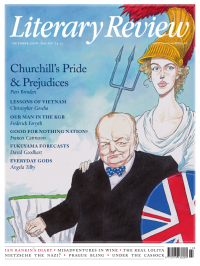Robert McCrum
The Sum of His Books
On V S Naipaul 1932–2018
The last time I saw V S Naipaul, on the stage of the Royal Festival Hall during the hoopla surrounding the so-called Golden Booker, for which I’d nominated his In a Free State, he was in a wheelchair and wore the ageless mask of Tiresias, seeming not to know how and why he was there, or who was who.
My neighbour at the event, another judge, whose family is friends with Naipaul’s, whispered, ‘How Vidia must be hating this.’ Sadly, it was as though he was already gone, his majestic oeuvre beginning to take on its posthumous immortality.
Such a verdict would probably not come as a surprise to Vidia himself. In life, for most of his eighty-five years, Naipaul was fully attuned to his own significance. ‘My story is a kind of cultural history’, he once told me. At the same time, resisting oversimplification, he liked to quote Proust’s Against Sainte-Beuve: ‘A book is the product of a different self from the self we manifest in our habits.’ The words of Proust, he’d add, should be with the reader who explores the biography of a writer. ‘No amount of documentation, however fascinating, can take us there. The biography of a writer … will always have this incompleteness.’
Vidia would always describe himself as a double exile (from India and from Trinidad), a scholarship boy from ‘an immigrant family on a small plantation island in the New World’. Born in Trinidad into a Hindu family in 1932 to a prominent local journalist, he was educated in Port

Sign Up to our newsletter
Receive free articles, highlights from the archive, news, details of prizes, and much more.@Lit_Review
Follow Literary Review on Twitter
Twitter Feed
It wasn’t until 1825 that Pepys’s diary became available for the first time. How it was eventually decrypted and published is a story of subterfuge and duplicity.
Kate Loveman tells the tale.
Kate Loveman - Publishing Pepys
Kate Loveman: Publishing Pepys
literaryreview.co.uk
Arthur Christopher Benson was a pillar of the Edwardian establishment. He was supremely well connected. As his newly published diaries reveal, he was also riotously indiscreet.
Piers Brendon compares Benson’s journals to others from the 20th century.
Piers Brendon - Land of Dopes & Tories
Piers Brendon: Land of Dopes & Tories - The Benson Diaries: Selections from the Diary of Arthur Christopher Benson by Eamon Duffy & Ronald Hyam (edd)
literaryreview.co.uk
Of the siblings Gwen and Augustus John, it is Augustus who has commanded most attention from collectors and connoisseurs.
Was he really the finer artist, asks Tanya Harrod, or is it time Gwen emerged from her brother’s shadow?
Tanya Harrod - Cut from the Same Canvas
Tanya Harrod: Cut from the Same Canvas - Artists, Siblings, Visionaries: The Lives and Loves of Gwen and Augustus John by Judith Mackrell
literaryreview.co.uk